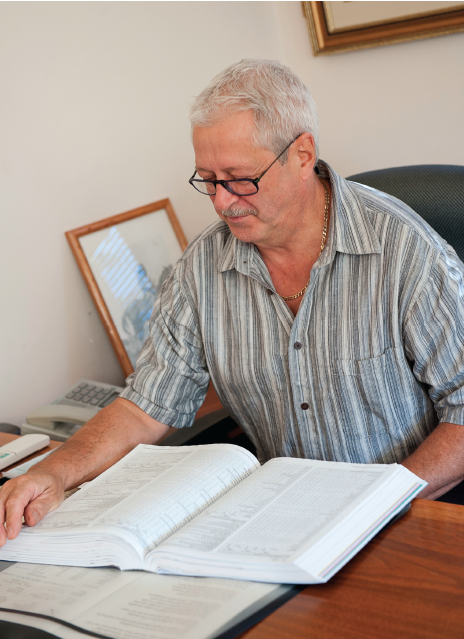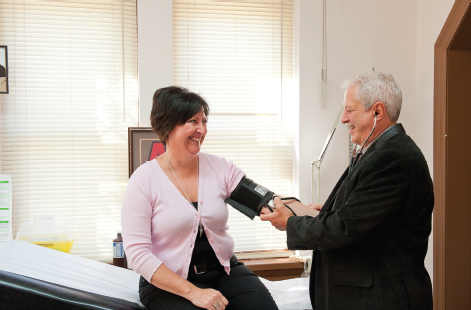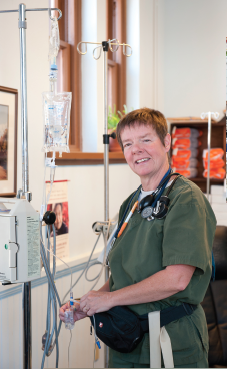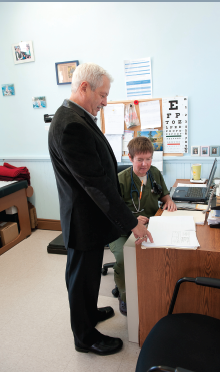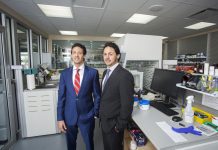Dr Ben Boucher,MD
Integrative management of vector – transmitted illness
Dr Ben Boucher, MD, was born and raised in the Havre Boucher region (Antigonish County) of Nova Scotia. He is quick to highlight his Aboriginal and Acadian ancestry, which he traces back to the 1700’s, as a driving force in his lifelong self- image of individualism- an individual who finds himself having spent a lifetime at odds with the status quo. Physicians who fully embrace the tenants of individualized, holistic medicine seem to share this sense of “being different”, and Dr Boucher is no exception.
Every healthcare provider tells a story of when in their lives they felt compelled to pursue their respective career path. Ben describes his choice was made at the age of five, when he was called upon by his father to tend to an ailing relative. His formal training began in 1974 at Dalhousie Medical School, preceded by an honours undergraduate degree in biology from St Francis Xavier University. His interest in integrative medicine was established by the time he arrived at medical school. Ben described his medical training as “frustrating”, with “excessive competitiveness”, and a lack of interest in anything outside of established norms. He discussed a paper in his second year of medical school that assimilated evidence of vascular outcomes associated with vitamin E supplementation, and experienced scrutiny from professors for his efforts.
He opened his first practice on Cape Breton Island in 1979, where he spent a wonderful summer working as the Warden for the Cape Breton Highlands National Park. He had a strong desire to “be where he was needed”, and Cape Breton seemed a perfect fit as the family physician of the community had passed away in 1949. Eventually Ben moved his practice to Port Hawksbury where he has been for the past 17 years.
An extremely influential experience in Ben’s life occurred in 1990 when he attended an ACAM conference and chelation workshop. He was fascinated to learn concepts of oxidant/ antioxidant chemistry, the impact of heavy metals on human health, and the ability of chelation therapy to effectively treat vascular disease. He quickly implemented chelation therapy in his private practice, and since 2007 has served as a site for the ongoing TACT trial of chelation therapy for secondary prevention of cardiovascular disease. Shortly after implementing chelation therapy in private practice, Ben witnessed the therapy spare an elderly patient from amputation of a limb deemed necessary as a complication of diabetes.
In 1991, three months after offering patients chelation, and on the heels of the one incredible case described above, the Provincial Medical Board of Nova Scotia (PMBNS) banned chelation therapy for vascular disease. Ben found this puzzling as he was the only physician in Nova Scotia offering the therapy at the time. Ben set into motion a cleaver series of events; the patient who had been spared from amputation and continued to receive regular chelation treatments had an attorney write the PMBNS and threaten to sue. The letter read to the effect of: “the treatment has been effective for me, has spared me amputation, and your actions threaten to make the treatment unavailable”. The PMBNS did not question future treatments.
In 2008 Ben began treating Lyme related illness. Again, the impetus stemmed from a desire to do what was needed. He no longer considers the paradigm as Lyme- related, preferring to apply a broader term he has coined; “vector transmitted infection”. While most public health effort in the area focuses on Lyme, Ben is quick to highlight a long list of vectors capable of transmitting illness, including bartonella, babesia, erlichia, anaplasma, and others. The basis for the present lack of understanding of these infections, and the poor definitions of treatment strategies primarily stem from the extreme difficulty in making an objective diagnosis. Sensitivity and specificity of testing methods, especially in cases where the infection is months to years old, are horrifically poor. To overcome this obstacle, Ben relies primarily on the patient’s symptomatic presentation to base the diagnosis.
Ben’s approach to diagnosis relies on a thorough review of symptoms questionnaire, where patients are requested to rank the severity of each symptom they report. Ben suspects vector transmitted illness when a patient reports multiple symptoms (15+) that span multiple body systems, and that are of a very severe magnitude. Objective evaluation has ruled out more commonly suspected causes, leaving vector transmitted illness as the most likely cause. Ben has set the bar very high to suspect such illness, evidenced by the extreme magnitude of debility patients present with to be considered for the diagnosis. The treatment approach is aggressive, and long term. Antibiotics are the mainstay, but true to Ben’s holistic application of healthcare, the implementation takes on unique characteristics. First and foremost, patients are counselled to improve diet quality, and as treatment progresses to adopt physical activity. Initially, herbal antibiotics take the place of prescriptions; Ben has found that prescription antibiotics work better when herbal antibiotics are used first for a period of a couple of months. He uses the Byron White and other herbal formulas, commonly observing symptom picture severity improve from scores of 8-9/10 to scores of 3-4/10 within a couple of months, but then the patient plateaus. Prescription antibiotics are then introduced to “finish the job”, which again often requires several months of therapy to achieve.
Ben is eager to share his experiences in the realm of vector transmitted infections due to what he describes as an unacceptable negligence of the commonality of the problem. He sees himself as one of only a handful of physicians across Canada treating patients for this underlying cause of significant debility. As such, patients are referred to his care from across Canada.
As impressive as Ben’s achievements as a physician is his commitment to his community and his own health. Ben ran for political office in two separate elections during the 1980’s as an NDP candidate. He envisioned utilizing the web as a means of operating elections and national referendums, a strategy he felt would achieve greater involvement from the public in the process of politics, and reduce public apathy. As a patient role model, Ben lives the life he requests patients to follow, most evident in his personal fitness regime that includes pedal biking, swimming, kayaking, snow shoeing, and power walking.
IHP is grateful to Dr Ben Boucher for allowing us to present his work to you. He is a member of the rare club of physicians who have been blazing a path for future waves of integrative healthcare providers to follow long before the concepts were household in nature. He does not treat what is most convenient, but what is most pressing. In recent years he has found himself operating in an obscure field of medicine; instead of being intimidated in this arena of poor objective evaluation, his tireless efforts have produced the standard of care for it.
